Date:2019-10-25
Unlike previous travels, this field trip to Germany was for attending Tsinghua University’s MBA overseas module: Global Immersion in Germany. The program was led by Professor LI Donghong and teachers of MBA Programs. Classes of the program were partly arranged at Mannheim Business School located in the second largest Baroque castle in Europe except Louvre. We also visited the headquarters of SAP at Walldorf, BASF and its factory at Heidelberg, the factory and museum of Mercedes-Benz, Sino German HiTech Park and other places. It was a fruitful and tightly scheduled journey leaving us a new impression and understanding of Germany on the whole.
At 0:00am (Beijing time) on October 1st, all our classmates joined in beautiful Heidelberg to make a short video to celebrate the 70th anniversary of our motherland, expressing our best wishes and affection to our homeland.
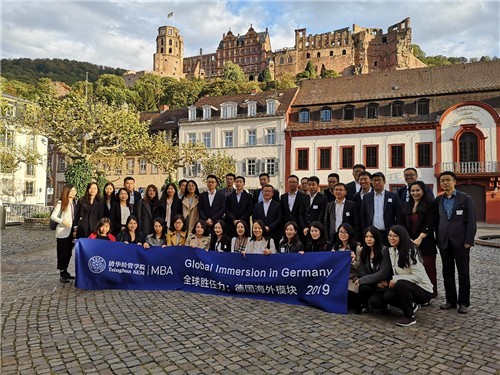
At the square in front of Heidelberg Castle
Classroom Teaching
The overseas module includes three excellent lectures by professors of University of Mannheim, during which they decode the current situation of the German economy from different perspectives.
As for Germany’s national economic structure, small and medium-sized businesses make up the foundation of the economy, and a large amount of hidden champion companies are produced. These companies are small but beautiful. Most of them are family businesses with relatively small scale and emphasis on innovation and specialized fields. Historically, Germany, with a unique location in central Europe, like the central plains in ancient China, is a place contested by all strategists and has a long history of being conquered and divided by Roman Empire, Frankish Kingdom, Austro-Hungarian Empire and other historical powers. It took long detour from Hamburg to Munich and even required change of currencies for 25 times. The instability caused by war and political environment has led to the unique current situation that Germany’s small and medium-sized enterprises serve as the backbone of the national economy. It is also the instability of environment that has shaped their prudent and conservative character. The historical conflicts also results in Germany’s cultural differences. 20 years ago, as the Berlin Wall fell down, large quantities of capital flew into East Germany for infrastructure building, making East Germany now a very livable place. However, because of the flourishing right wing populism, East Germany is still the area of the lowest economic growth and smallest number of new immigrants. Since Chancellor Schröder took office, Germany has been committed to peace, stability and development of economy in joint efforts, and Germany has grown after its unification from the bottom on the list of EU countries by GDP to the EU country of the largest GDP and the 4th largest economy in the world. Peace and stability are always the precondition of economic development.
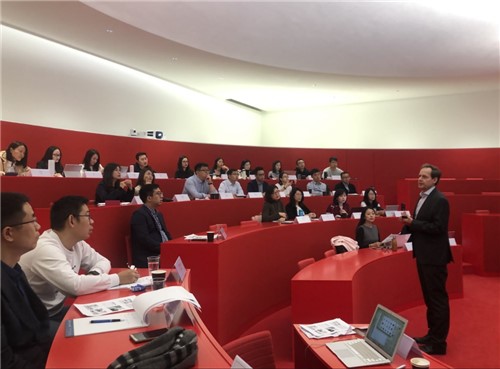
At the lecture by Professor Pfisterer of Mannheim Business School
After the second world war, Germany had two monstrous economic bubbles which put the country and the people in deep sense of fear and guilt towards being indebted. The German people would rather save money at banks. Considering the almost negative saving interest rate in Germany and inflation, it is actually losing money to save in banks, but people still choose to do so, reflecting the prudence and conservatism that have been deeply rooted in the character of the people, enterprises and even the country. Interestingly, although the German people are very conservative and frugal in diet and clothing, they would spend most of their money buying cars, particularly Mercedes-Benz cars. Being frugal is consistent with their character. As for buying Mercedes-Benz cars, according to Professor A. Pfisterer of Mannheim Business School whom we consulted with, the German people take pride in Benz that has led the age of modern cars and would like to spend money on what they are proud of.
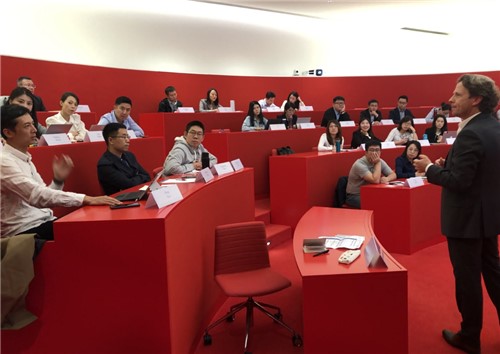
At the lecture by Professor Dr. Woywode of Mannheim Business School
The German overseas module emphasizes on using data to present the current situation of German small and medium-sized enterprises as the backbone of the national economy, and on explaining its causes from historical perspectives. The German rigorous academic attitude is fully reflected in abundant data, solid background research, study from various perspectives, entertaining class teaching full of interaction, and professors of widely learning.
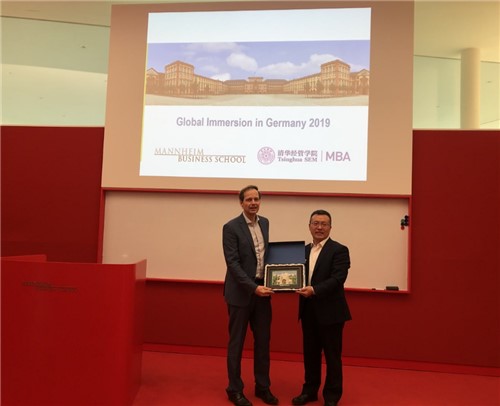
Professor LI Donghong and Professor Pfisterer exchanged gifts on behalf of their schools
Visiting Enterprises
The German overseas module includes visiting enterprises like SAP headquarters and SAP AppHaus, Benz smart factory and museum, BASF headquarters and smart factory, and Sino German HiTech Park.
SAP, a company committed to assisting digital transformation of enterprises through information technology, presented to us its transformative development from birth to growth. The creator of the company came from IBM and got the start-up inspiration from punch-card machine. Initially unrecognized, the company could only get financed by banks from hometown. Now it has become the highest valued company in Europe. The development of the company fully reflects Germany’s credit system behind the strong interpersonal bond for small and medium-sized companies, and also the transformation brought by the trend of information technology. As the wave of digital information comes, people indulged in traditional economic models, just like the Surinamese people who still eat raw meat and drink animals’ blood, don’t know the enormous changes that has happened in the outside world. The shock of new economic model is like the one faced by the local people in Suriname who lost land and freedom since the Europeans set foot on their land. It is a huge challenge to follow and even to ride the wave of the era. SAP has very good tips for us, that is, oriented by customer demand, focus on customer value, and customer value sharing.
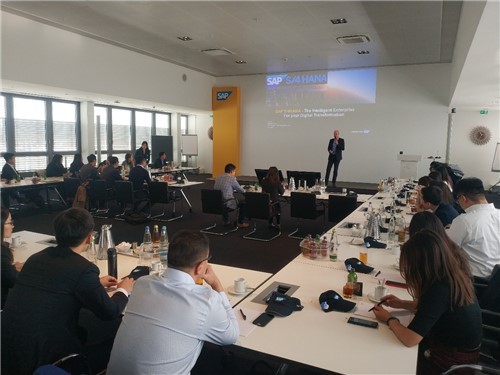
Vice president of SAP cloud business delivered remarks to students
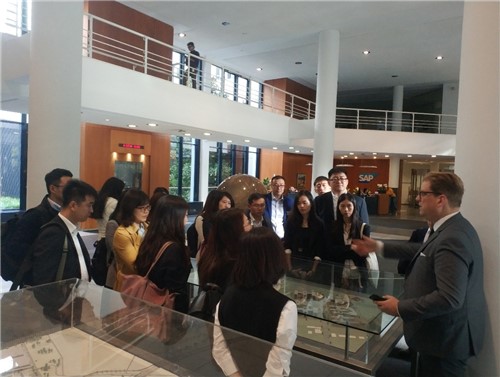
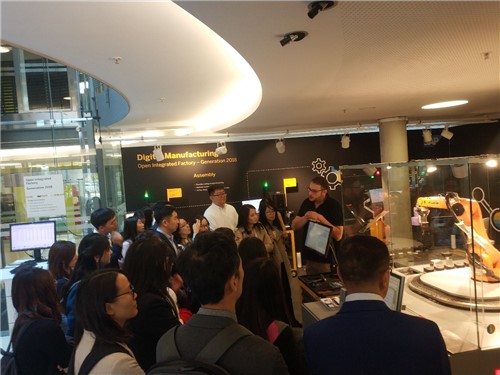
Visiting SAP headquarters
Design Thinking Workshop, a specifically arranged teaching experience in the overseas German module, is an innovative thinking model based on demand and aims to create practical solution of business value. Professionals from SAP with start-ups training background guided students by explaining the profound in simple terms. Students were divided into groups randomly, and started case study using new methods to solve problems.

At Design Thinking Workshop of SAP AppHaus in Heidelberg
The final group presentation was entertaining and the course was finished in laughter. The teacher expressed the hope that Design Thinking could live as the hat-wearing cartoon dog in our memory. Yes, We would not forget it: focus on intuition and fast decision, and think outside the box; identify and recognize the problem from macro perspective before working out solutions. The most operable and effective solution path can be found by using four-quadrant division from perspectives of operational convenience and efficacy.
In the process of digital transformation, intelligent information has brought new driving force to traditional industries like Benz and BASF. We were shocked by the smart factory of Benz, where over 1500 huge six-axis robotic arms worked with each other in an orderly manner, making the assembly line operation more intelligent and controllable. At the overall assembly line, each car was different from others in its color, model and even the direction of the steering wheel, reflecting customization and distribution features of industry 4.0. We also noticed an interesting detail that workers under the overall assembly line didn’t even wear helmet, showing their 100 percent confidence in safety at the factory.
BASF is as confident as its poster shows “We Create Chemistry”. After visiting the company’s customer experience centre and its shocking industrial park, I believe this company deserves its reputation: countless huge pipelines working together in orderly and harmoniously manner, reasonable deployment of the industrial park, high quality work staff, and the kindergarten inside the company as a best reflection of confidence in the safety management. Although China has been at forefront of the world in intelligent economy and OTT in particular, we still lag far behind Germany in precision management, strictness, safety and controllability of the manufacturing industry. After witnessing all these, we perceived more profoundly that intelligent economy had changed economy and life unnoticed, making production and life more efficient and safe, and even changing production relations and productive force fundamentally.
From visiting the Sino German HiTech Park, we directly felt the emphasis that German companies put on China’s huge market. Both sides need to go global and bring in, in terms of technology, economy, culture and other aspects. With demands from both sides, the foundation of cooperation lies in finding trustworthy platforms and institutions for implementation.
The German overseas module brought us deep down to frontlines of enterprises so that we learned about the birth and development of companies, and how digital economy empowered and transformed the traditional economy. The diverse visits to companies allow us to have in-depth dialogues with classic and successful German companies, and make us fully confident about the unlimited potential of future.
Group Presentation
The group presentation on the final day was commented by Professor A. Pfisterer of Mannheim Business School. The four topics were about problems facing Germany now, including shortage of labor, intelligent transformation, inheritor of small and medium-sized businesses. Each group had its unique perspective towards the same issue. At the final presentation, Professor Pfisterer still gave us new inspirations with new data and ideas. Students had made preparations early on to make the final presentation as perfect as possible. Every evening, there were students diligently discussing and revising speech drafts.
The module also arranged a dinner with senior manager of SAP cloud business, and exchanges with MBA students of University of Mannheim. Through such easy-going communications, we learned about SAP’s business from more enriched perspectives and what German MBA students had focused on and experienced.
During the overseas field trip, we also had a night tour of Heidelberg, a city breeding beauty and wisdom. Here, the cold and heavy knocker left a deep imprint on the wooden gate, and each brick of the city gate was branded with the name of the artisan. As Goethe said, “I have my heart lost in Heidelberg”.
Compliments
We appreciate Tsinghua SEM MBA Programs for the opportunity of this overseas field trip. The German overseas module has far exceeded our expectations. We learned a lot from it and were always full of expectations for the next arrangement in the tight schedule. The trip is full of highlights such as the professors who explained profound issues of German history, politics, geography and economy from many perspectives in entertaining and simple terms, the most pragmatic and highly efficient companies that we visited, the friendship with classmates who were smart and most hard-working, and the acquaintances with the most earnest and lovely teachers.
As Professor A. Pfisterer of Mannheim Business School said, “these experiences must be inspiring for you, and the inspiration that rises from the study and clash of thoughts will take you out of the shackles of mindset and encourage you to explore for new possibilities.”
Every time we saw pictures shared in the constantly interactive wechat group of the German module, and recalled the short but colorful 5-day trip, our hearts were filled with joy.
Written by: ZHANG Danting of P2 Class MBA 2018
Edited by: QIN Wen, SHI Siyao of MBA Programs